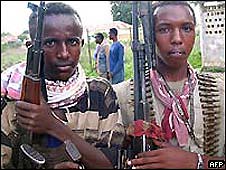
Somali guerrillas fight against the US-backed occupation of their country the Ethiopian military. Piracy has increased off the coast and millions have been displaced over the last two years., a photo by Pan-African News Wire File Photos on Flickr.
EU Plans to Boost East Africa’s Capacity to Deal With Pirates
By David Malingha Doya on April 24, 2012
The European Union will begin a program to help East African nations improve maritime security as pirate attacks in the region decline, EU Ambassador to Tanzania Filiberto Ceriani Sebregondi said.
The so-called Regional Maritime Capacity Building program will cover Somalia, Kenya Tanzania, Djibouti, Seychelles and Mauritius, Sebregondi said in an interview yesterday in Dar es Salaam, Tanzania’s commercial capital. “The program starts in a couple of weeks or months, and will last for one to two years, with a possibility of extending it,” he said.
The EU also plans to spend 16 million euros ($21 million) extending its anti-piracy program off the coast of Somalia over the next two years to secure United Nations food shipments to the war-torn country, he said. Sebregondi spoke on board the HNLMS Van Amstel, a multi-purpose military vehicle that has been docked at Dar es Salaam since April 21.
Global pirate attacks fell 28 percent to 102 incidents in the first quarter as naval interventions reduced incidents off the coast of Somalia, the International Maritime Bureau said yesterday. Attacks near Somalia declined to 43 from 97 and the number of vessels that were hijacked also dropped.
In Somalia, the capacity-building program will focus on enabling the police and the judiciary to start handling the piracy problem domestically, Sebregondi said.
The bloc also plans to sign a pirate-transfer agreement with Tanzania “soon” to allow the EU to hand over suspected pirates captured at sea to Tanzanian authorities, Sebregondi said.
Busiest Waterway
The EU’s so-called Atalanta Operation started in 2008 to curb piracy off Somalia’s coast and to secure vessels used by the African Union peacekeeping mission in Somalia known as Amisom. Ships travelling through the Suez Canal, the world’s busiest man-made waterway, must travel by Somalia’s coastal waters. Total trade valued at $1 trillion moves through the region, according to the EU naval force.
The EU’s intervention helped secure UN deliveries of food aid to Somalia, which has lacked a functioning central government since civil war erupted in 1991, Richard Reagan, the World Food Programme’s representative in Tanzania, said in a separate interview yesterday from Dar es Salaam.
“Since our merchant-chattered vessels going to Somalia got this protection, we have not had any piracy incidents,” he said. “I may not give you exact numbers, but we had several incidents in the past.”
‘Life-Saving Assistance’
The UN food agency is now reaching more than 1.5 million people with “life-saving” assistance, said Reagan. The Horn of Africa region experienced the worst drought in 60 years last year that triggered a famine in six regions in Somalia.
The WFP successfully delivered 854,181 metric tonnes of food to Somalia through its main port of Mogadishu, as well as the towns of Merka, Bossaso and Berbera port in Puntland with protection from the EU Naval Force, according to Hans Veerbeek, commanding officer of the HNLMS Van Amstel.
About 150 WFP ships and 126 under Amisom have been safely escorted since 2008. Total pirate attacks are 539 in the same period, while 126 ships have been actually pirated, according to information from the EU. The naval force has disrupted 114 attacks, according to the information.
To contact the reporter on this story: David Malingha Doya in Dar es Salaam via Nairobi at pmrichardson@bloomberg.net.
To contact the editor responsible for this story: Paul Richardson at pmrichardson@bloomberg.net.
No comments:
Post a Comment